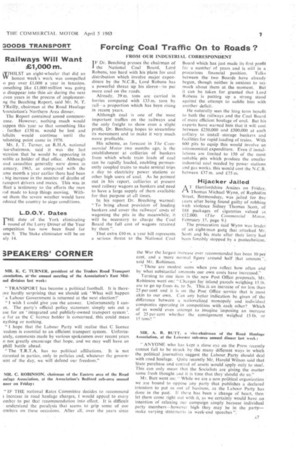Forcing Coal Traffic On to Roads ?
Page 9

If you've noticed an error in this article please click here to report it so we can fix it.
FROM OUR INDUSTRIAL CORRESPONDENT IF Dr. Beeching presses the chairman of the National Coal Board, Lord Robens, too hard with his plans for coal distribution which involve Major expenditure by the N.C.B., Lord Robens has a powerful threat up his sleeve—to Put more coal on the roads.
Already, 39 in. tons are carried in lorries compared with 133 m: tons by rail—a proportion which has been rising in recent years.
Although coal is one of the most important traffics on the railways and the only freight to show even a slight profit, Dr. Beeching hopes to streamline its movement and to Make it very much more profitable.
His scheme, as forecast in The Commercial Motor two months ago. is the establishment at collieries of bunkers from which whole train loads of coal can be rapidly loaded, enabling permanently coupled trains to make several trips a day to electricity power stations or other high users of coal. As he pointed out in his report, collieries at present used railway wagons as bunkers and need to have a large supply of them available for that purpose at all times.
In his report Dr. Beeching Warned: "To bring about provision of loading bunkers and cover the railways' costs of wagoning the pits in the meanwhile; it will be necessary to charge the Coal Board the full cost of wagons retained by them".
That extra £10 m. a year bill represents a serious threat to the National Coal Board which has just made its first profit for a nuMber of years and is still in a precarious financial position. Talks between the two Boards have already begun, though neither is anxious to say much about them at the moment. But it can be taken for granted that Lord Robens is putting up a strong stand against" the attempt to saddle him with another deficit.
He naturally sees the long term benefit to both the railways and the Coal Board of more efficient haulage of coal. But his experts have warned him that it will cost between £250,000 and £500,000 at each colliery to ,install storage bunkers and facilities for rapid loading of trains. With 600 pits to equip this would involve an astronomical expenditure. Even if installations are limited to 150 of the most suitable pits which produce the smaller industrial coal needed by power stations and gas works, this would cost the N.C.B. between .£37 m. and £75 m.
Hijacker Jailed A T Hertfordshire Assizes on Friday, 1-1 Thomas Michael Wynn, of RePhidim Street, Bermondsey, was jailed for five years after being found guilty of robbing with violence Sidney 'Thomas Scott, of 188 packages of cigarettes valued at I:12,000: (The Commercial Motor, February )5, page 9.) The prosecution said Wynn was leader of an eight-man gang that attacked Mr. Scott and his mate after their lorry had been forcibly stopped by a pantechnicon.








































































































































